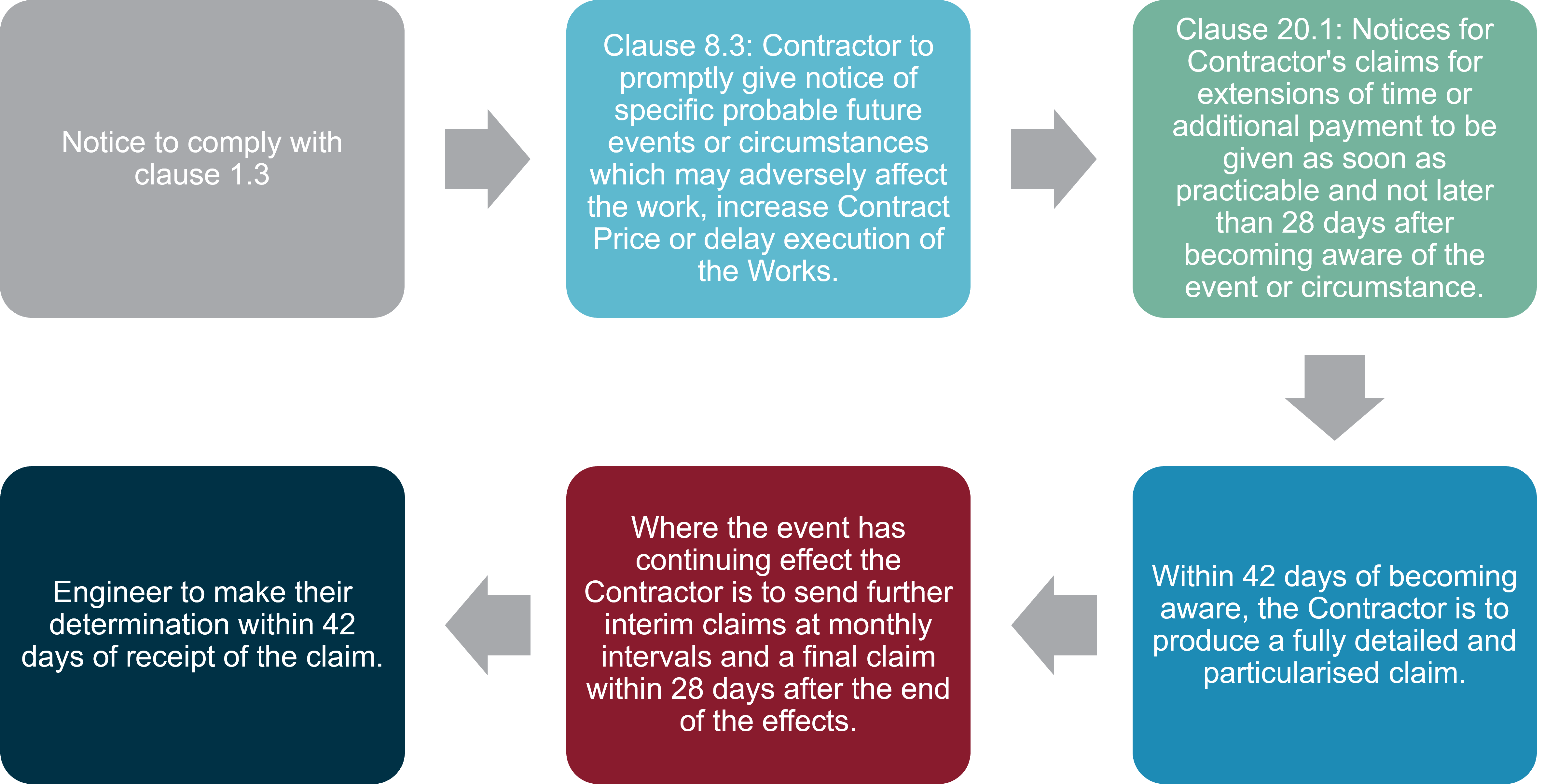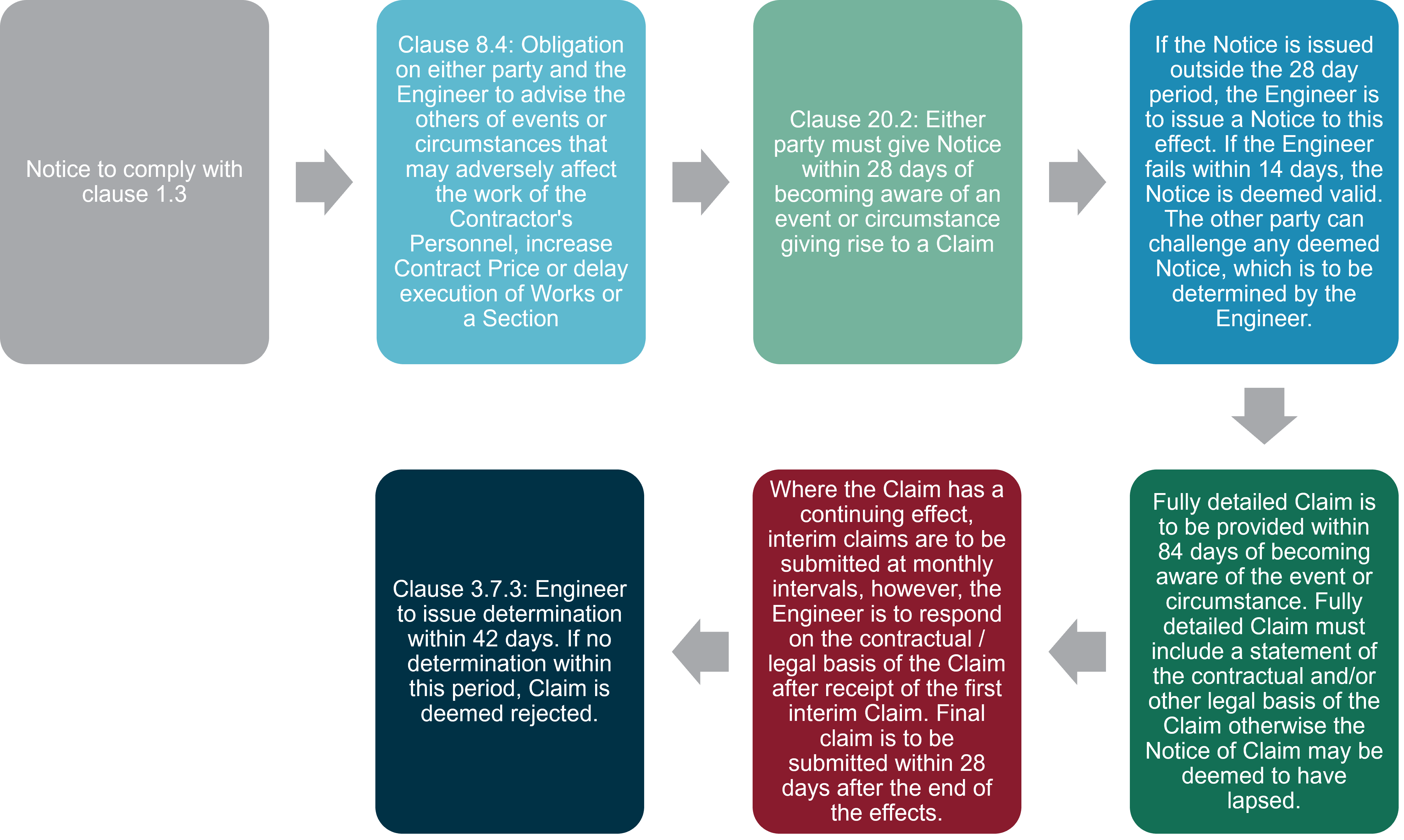Operation of the standard forms: FIDIC
In this section, we have summarised certain provisions in the FIDIC Yellow Book 1999 and 2017 editions. It is also important to note that in projects, your contracts may be heavily amended and therefore always refer to the agreed versions (as amended) and seek legal advice as required.Please get in touch if you have any specific queries about your contract.
The FIDIC standard form contracts were created so that they could be used for a variety of construction and infrastructure projects around the world (putting aside the technical and geographical specificities of the project). They are recognised and used globally and in many jurisdictions, on all types of projects.
The different model contracts are organised around the extent of design and responsibilities assumed by the employer and the contractor. The contracts are generally known by the colour of their book, the current suite including the:
- Red Book – where works are predominantly designed by the employer;
- Yellow Book – where works are predominantly designed (and built) by the contractor;
- Silver Book – for use on turnkey projects;
- Green Book – for use as a short form of contract designed for “lower risk” projects;
- Pink Book – for use on projects funded by participating multilateral development banks such as the World Bank;
- Gold Book – where the contractor operates the asset in addition to designing and building;
- Blue-Green Book – for all types of dredging and reclamation works and ancillary construction;
- Emerald Book – for underground works and other types of works that include significant geotechnical uncertainty; and
- White Book – for use between an employer and its professional consultant (such as an architect or engineer).
The FIDIC suite of contracts are usually divided into two parts, with Part 1 containing the general terms of the contract and Part 2 specifying the particular conditions relevant to the project.
They will often acknowledge that special conditions will be required for project-specific issues on a case-by-case basis, to enable the use of the contracts globally, and to largely provide fair and balanced obligations and duties between the parties. The contracts are drafted in such a way so as not to favour one party against the other, but rather aim to be fair and to protect both parties.
A more specific feature of the FIDIC contracts is that all FIDIC books define the role of the engineer essentially as the agent of the employer primarily responsible for contract administration. The role and authority of the engineer may include:-
- Issuing instructions, notices and certificates;
- Valuing variations; and
- Monitoring and certifying the works.
In contrast to other standard form contracts (such as the JCT or NEC), the engineer, as an administrator of the contract, might not be impartial – for example, in the Red and Yellow Books, the engineer could be deemed to act for the Employer.
Dependent on the model contract chosen, the contract may also require the parties to refer any dispute to a Dispute Adjudication Board (DAB) as part of an informal process which encourages the parties’ involvement. View our disputes section for more info.
Potentially relevant entitlements to an extension of time (EOT) include:
- Clause 8.4(c)/clause 8.5(c): exceptionally adverse climatic conditions. The 2017 edition defines such conditions as adverse climatic conditions at the Site which are Unforeseeable having regard to the climatic data made available by the Employer under Sub-Clause 2.5 or published in the Country for the geographical location of the Site.
- Whether the event is Unforeseeable (as defined) will depend upon the date of the Tender.
- The contractor will need to factor in weather events expected as a result of the Site Data provided by the Employer and from publicly available information in the location of the project.
- Clause 8.4(d)/clause 8.5(d): Unforeseeable shortages in the availability of personnel or Goods (2017 ed: or Employer-Supplied Materials, if any) caused by epidemic or governmental actions
- Whether the event is Unforeseeable (as defined) will depend upon the date of the Tender.
- “Epidemic” and “governmental actions” are broad terms.
- Only applicable to shortages of availability of personnel or Goods so appears not applicable to general delays in performance e.g. associated with difficulties of working on site.
- Clause 8.5/clause 8.6: Delays or disruptions caused by Authorities if: the Contractor has diligently followed procedures laid down by the relevant legally constituted public authorities (2017 ed: or private utility entities) in the Country; authorities delay or disrupt the Contractor’s work; and delay or disruption was Unforeseeable
- Whether the event is Unforeseeable (as defined) will depend upon the date of the Tender.
- Whether the Contractor has “diligently” followed procedures will be a question of fact and accurate records should therefore be kept.
- Clause 13.7/13.6: Delays as a result of change in Laws of the Country or in the judicial or in the official governmental interpretation of such Laws, made after the Base Date.
- Must be a change in Laws of the Country where the Site is located so will not apply to changes of laws in other countries which may affect the movement of labour or goods.
- Laws is widely defined but its application will depend upon the relevant action taken by the authorities in the jurisdiction of the Site.
- 2017 ed.: If an adjustment to the execution of works becomes necessary, Contractor or Engineer shall give Notice.
- Clause 19/18: Force Majeure/Exception Event (see below ‘How does FIDIC address force majeure/exceptional events?’ section)
If a contractor considers that it is entitled to additional payment under the contract, it must claim under clause 20.1/20.2 (which provides that you should notify the Employer of any claim within 28 days after it became aware, or should have become aware, of the event giving rise to the claim).
If entitlement is to Cost, it is defined at clause 1.1.4.3 (FIDIC 1999 ed): “all expenditure reasonably incurred (or to be incurred) by the Contractor, whether on or off the Site, including overhead and similar charges, but does not include profit” or clause 1.1.19 (2017 ed): “means all expenditure reasonably incurred (or to be incurred) by the Contractor in performing the Contract, whether on or off the Site, including taxes, overheads and similar charges, but does not include profit. Where the Contractor is entitled under a Sub-Clause of these Conditions to payment of Cost, it shall be added to the Contract Price”.
Mitigation will also be important here.
Definition of Force Majeure or Exceptional Event at clauses 19 (1999 ed.)/18 (2017 ed.): “exceptional event or circumstance“, beyond a Party’s control, which could not reasonably have been provided against before the Contract, having arisen could not reasonably have been avoided or overcome and which is not substantially attributable to the other Party. There is a non-exhaustive list of exceptional events and circumstances which may constitute force majeure/an exceptional event.
Notice is to be given within 14 days of becoming aware of the event of Force Majeure/ Exceptional Event if the Party “is or will be prevented from performing any of its obligations under the Contract” (clause 19.2/18.2).
Even if an event is Force Majeure/Exceptional Event, a Party will only get relief if works are “prevented“. If works are just more expensive, difficult or take longer, arguably they are not “prevented“.
Having given notice, the Party is excused from performance of the relevant obligations for the duration of the event (save for payment obligations) (clause 19.2/18.2). Under the 2017 ed. there is an additional requirement for the affected Party to give Notices every 28 days if the Exceptional Event has a continuing effect.
There is an obligation on each Party to use all reasonable endeavours to minimise any delay (clause 19.3/18.3). The obligation to mitigate extends to each Party so Parties are encouraged to work collaboratively to minimise delay.
Termination: if execution of substantially all of the Works is prevented for a continuous period of 84 days or multiple periods which total more than 140 days either party may give notice to terminate (clause 19.6/18.5).
“These materials are written and provided for general information purposes only. They are not intended and should not be used as a substitute for taking legal advice. Specific legal advice should be taken before acting on any of the topics covered.
Osborne Clarke is the business name for an international legal practice and its associated businesses. Full details here >
© Osborne Clarke LLP”









